Business Ethics - Assignment Solved PDF
VerifiedAdded on 2021/06/14
|10
|2746
|68
AI Summary
Contribute Materials
Your contribution can guide someone’s learning journey. Share your
documents today.
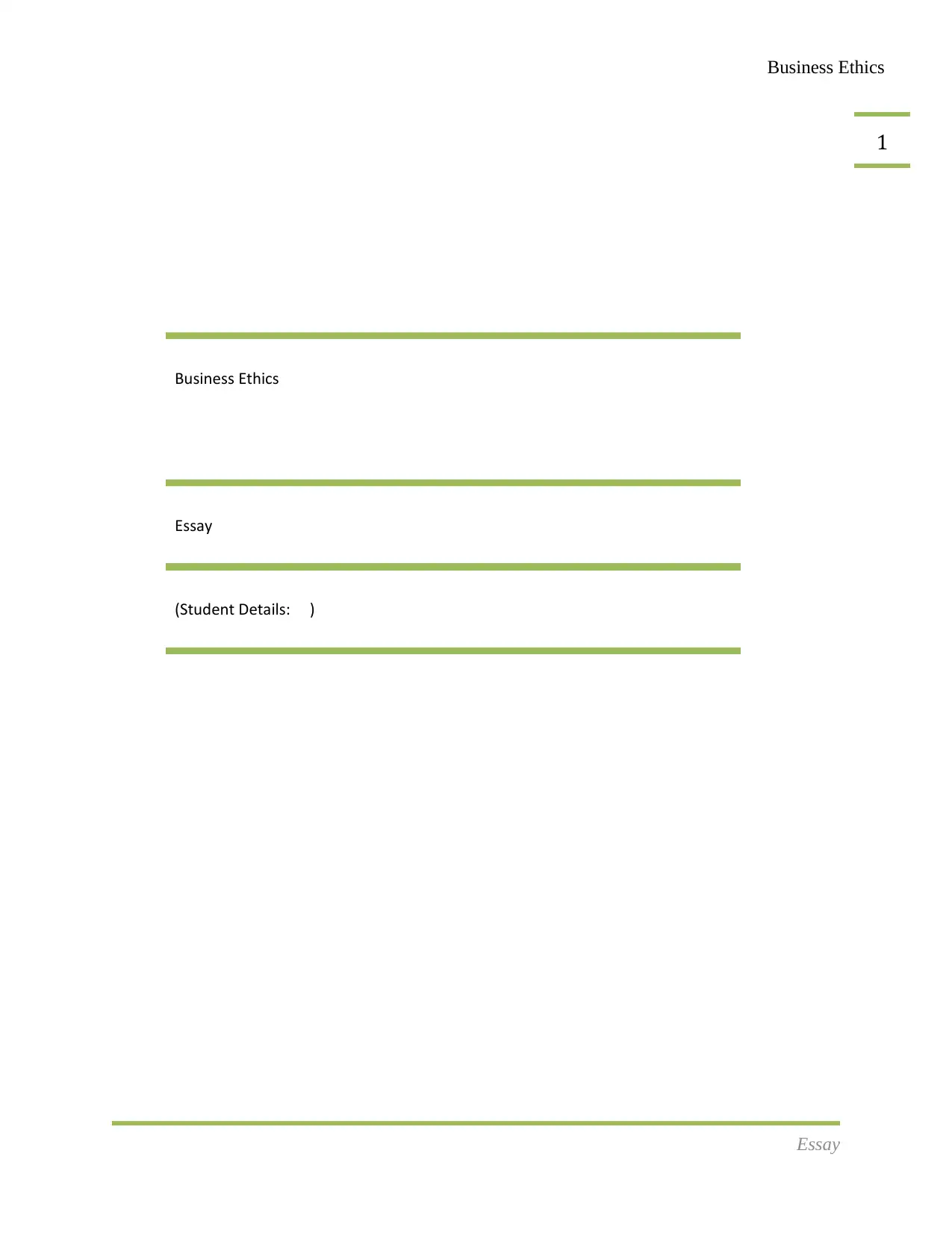
1
Business Ethics
Essay
Business Ethics
Essay
(Student Details: )
Business Ethics
Essay
Business Ethics
Essay
(Student Details: )
Secure Best Marks with AI Grader
Need help grading? Try our AI Grader for instant feedback on your assignments.
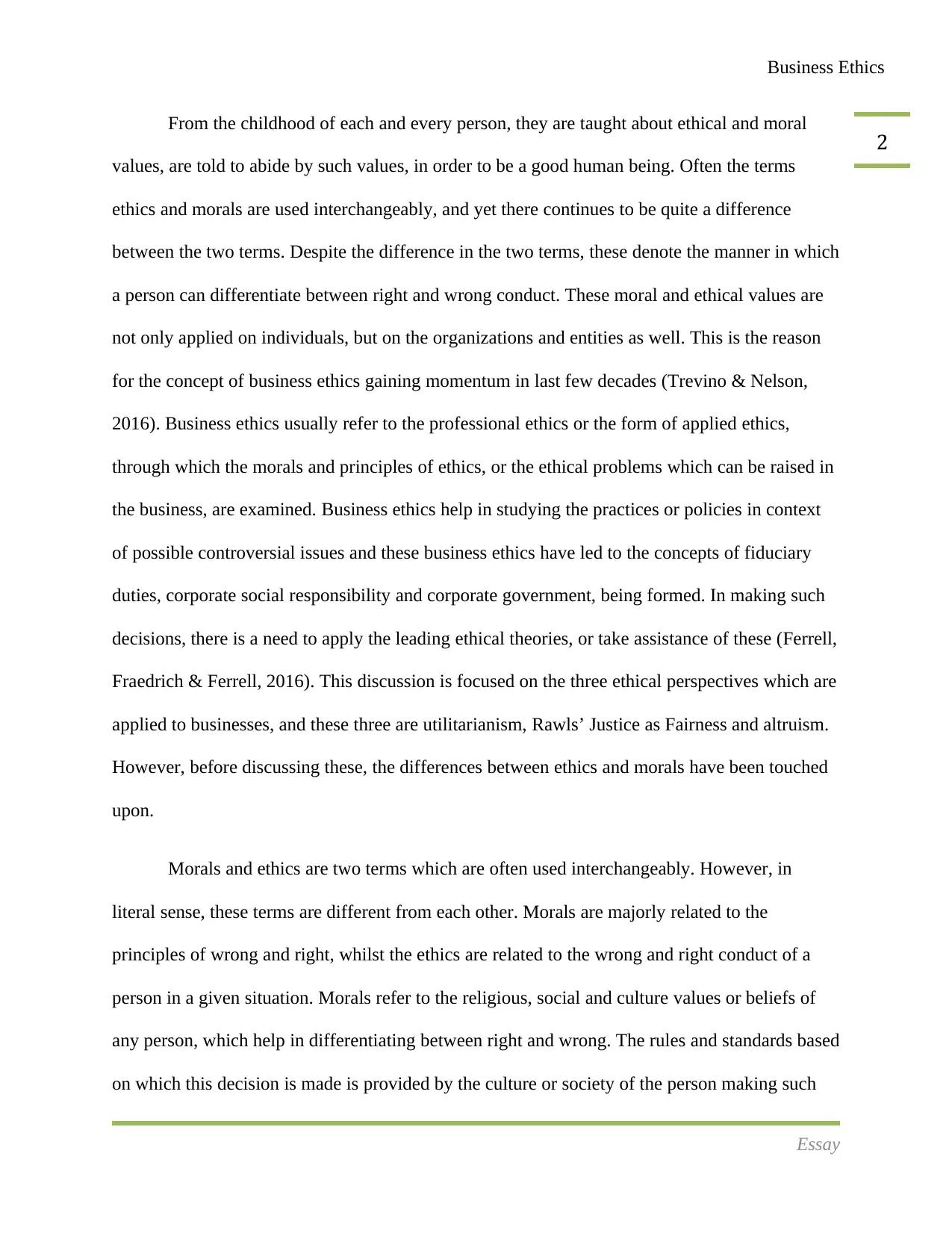
2
Business Ethics
From the childhood of each and every person, they are taught about ethical and moral
values, are told to abide by such values, in order to be a good human being. Often the terms
ethics and morals are used interchangeably, and yet there continues to be quite a difference
between the two terms. Despite the difference in the two terms, these denote the manner in which
a person can differentiate between right and wrong conduct. These moral and ethical values are
not only applied on individuals, but on the organizations and entities as well. This is the reason
for the concept of business ethics gaining momentum in last few decades (Trevino & Nelson,
2016). Business ethics usually refer to the professional ethics or the form of applied ethics,
through which the morals and principles of ethics, or the ethical problems which can be raised in
the business, are examined. Business ethics help in studying the practices or policies in context
of possible controversial issues and these business ethics have led to the concepts of fiduciary
duties, corporate social responsibility and corporate government, being formed. In making such
decisions, there is a need to apply the leading ethical theories, or take assistance of these (Ferrell,
Fraedrich & Ferrell, 2016). This discussion is focused on the three ethical perspectives which are
applied to businesses, and these three are utilitarianism, Rawls’ Justice as Fairness and altruism.
However, before discussing these, the differences between ethics and morals have been touched
upon.
Morals and ethics are two terms which are often used interchangeably. However, in
literal sense, these terms are different from each other. Morals are majorly related to the
principles of wrong and right, whilst the ethics are related to the wrong and right conduct of a
person in a given situation. Morals refer to the religious, social and culture values or beliefs of
any person, which help in differentiating between right and wrong. The rules and standards based
on which this decision is made is provided by the culture or society of the person making such
Essay
Business Ethics
From the childhood of each and every person, they are taught about ethical and moral
values, are told to abide by such values, in order to be a good human being. Often the terms
ethics and morals are used interchangeably, and yet there continues to be quite a difference
between the two terms. Despite the difference in the two terms, these denote the manner in which
a person can differentiate between right and wrong conduct. These moral and ethical values are
not only applied on individuals, but on the organizations and entities as well. This is the reason
for the concept of business ethics gaining momentum in last few decades (Trevino & Nelson,
2016). Business ethics usually refer to the professional ethics or the form of applied ethics,
through which the morals and principles of ethics, or the ethical problems which can be raised in
the business, are examined. Business ethics help in studying the practices or policies in context
of possible controversial issues and these business ethics have led to the concepts of fiduciary
duties, corporate social responsibility and corporate government, being formed. In making such
decisions, there is a need to apply the leading ethical theories, or take assistance of these (Ferrell,
Fraedrich & Ferrell, 2016). This discussion is focused on the three ethical perspectives which are
applied to businesses, and these three are utilitarianism, Rawls’ Justice as Fairness and altruism.
However, before discussing these, the differences between ethics and morals have been touched
upon.
Morals and ethics are two terms which are often used interchangeably. However, in
literal sense, these terms are different from each other. Morals are majorly related to the
principles of wrong and right, whilst the ethics are related to the wrong and right conduct of a
person in a given situation. Morals refer to the religious, social and culture values or beliefs of
any person, which help in differentiating between right and wrong. The rules and standards based
on which this decision is made is provided by the culture or society of the person making such
Essay
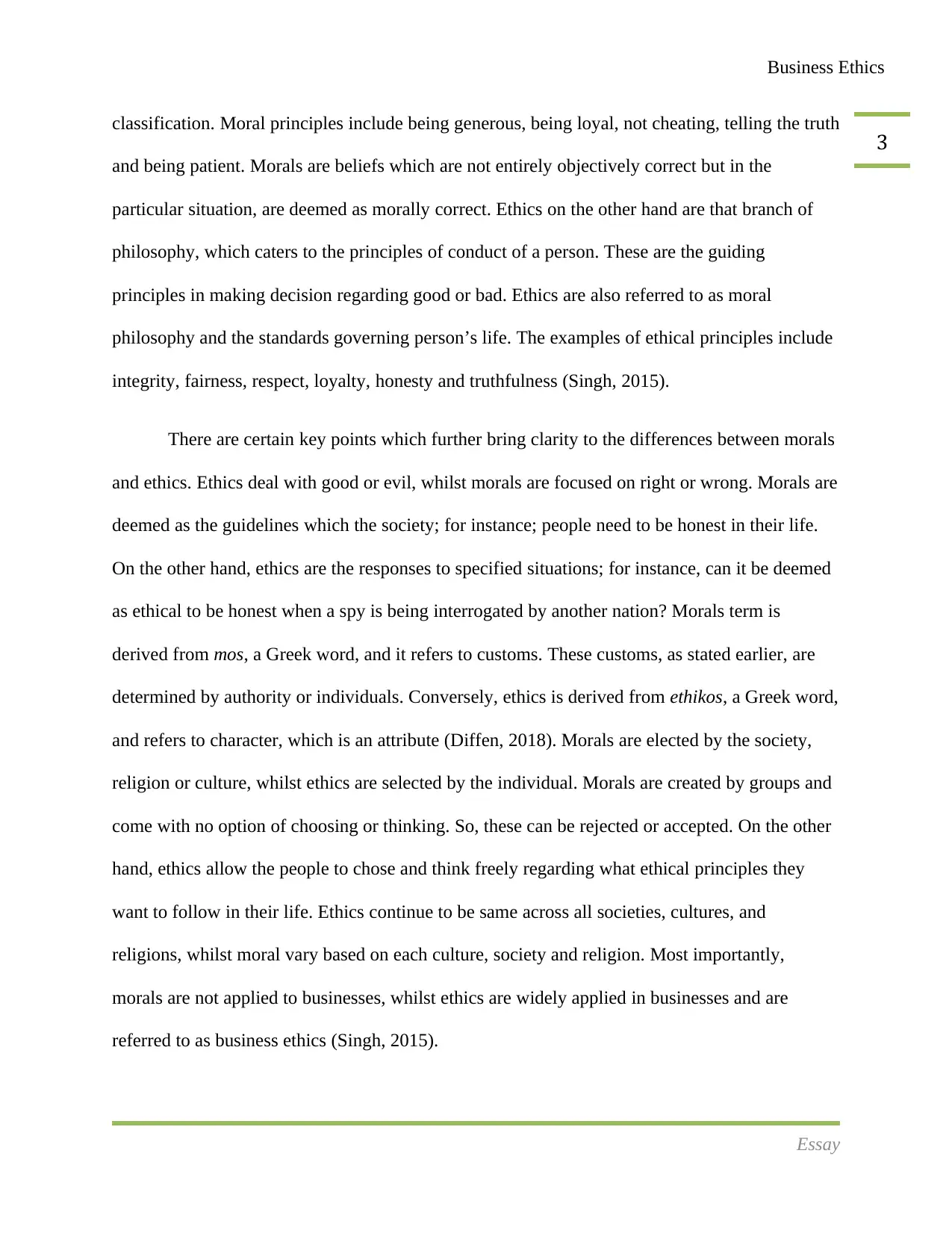
3
Business Ethics
classification. Moral principles include being generous, being loyal, not cheating, telling the truth
and being patient. Morals are beliefs which are not entirely objectively correct but in the
particular situation, are deemed as morally correct. Ethics on the other hand are that branch of
philosophy, which caters to the principles of conduct of a person. These are the guiding
principles in making decision regarding good or bad. Ethics are also referred to as moral
philosophy and the standards governing person’s life. The examples of ethical principles include
integrity, fairness, respect, loyalty, honesty and truthfulness (Singh, 2015).
There are certain key points which further bring clarity to the differences between morals
and ethics. Ethics deal with good or evil, whilst morals are focused on right or wrong. Morals are
deemed as the guidelines which the society; for instance; people need to be honest in their life.
On the other hand, ethics are the responses to specified situations; for instance, can it be deemed
as ethical to be honest when a spy is being interrogated by another nation? Morals term is
derived from mos, a Greek word, and it refers to customs. These customs, as stated earlier, are
determined by authority or individuals. Conversely, ethics is derived from ethikos, a Greek word,
and refers to character, which is an attribute (Diffen, 2018). Morals are elected by the society,
religion or culture, whilst ethics are selected by the individual. Morals are created by groups and
come with no option of choosing or thinking. So, these can be rejected or accepted. On the other
hand, ethics allow the people to chose and think freely regarding what ethical principles they
want to follow in their life. Ethics continue to be same across all societies, cultures, and
religions, whilst moral vary based on each culture, society and religion. Most importantly,
morals are not applied to businesses, whilst ethics are widely applied in businesses and are
referred to as business ethics (Singh, 2015).
Essay
Business Ethics
classification. Moral principles include being generous, being loyal, not cheating, telling the truth
and being patient. Morals are beliefs which are not entirely objectively correct but in the
particular situation, are deemed as morally correct. Ethics on the other hand are that branch of
philosophy, which caters to the principles of conduct of a person. These are the guiding
principles in making decision regarding good or bad. Ethics are also referred to as moral
philosophy and the standards governing person’s life. The examples of ethical principles include
integrity, fairness, respect, loyalty, honesty and truthfulness (Singh, 2015).
There are certain key points which further bring clarity to the differences between morals
and ethics. Ethics deal with good or evil, whilst morals are focused on right or wrong. Morals are
deemed as the guidelines which the society; for instance; people need to be honest in their life.
On the other hand, ethics are the responses to specified situations; for instance, can it be deemed
as ethical to be honest when a spy is being interrogated by another nation? Morals term is
derived from mos, a Greek word, and it refers to customs. These customs, as stated earlier, are
determined by authority or individuals. Conversely, ethics is derived from ethikos, a Greek word,
and refers to character, which is an attribute (Diffen, 2018). Morals are elected by the society,
religion or culture, whilst ethics are selected by the individual. Morals are created by groups and
come with no option of choosing or thinking. So, these can be rejected or accepted. On the other
hand, ethics allow the people to chose and think freely regarding what ethical principles they
want to follow in their life. Ethics continue to be same across all societies, cultures, and
religions, whilst moral vary based on each culture, society and religion. Most importantly,
morals are not applied to businesses, whilst ethics are widely applied in businesses and are
referred to as business ethics (Singh, 2015).
Essay
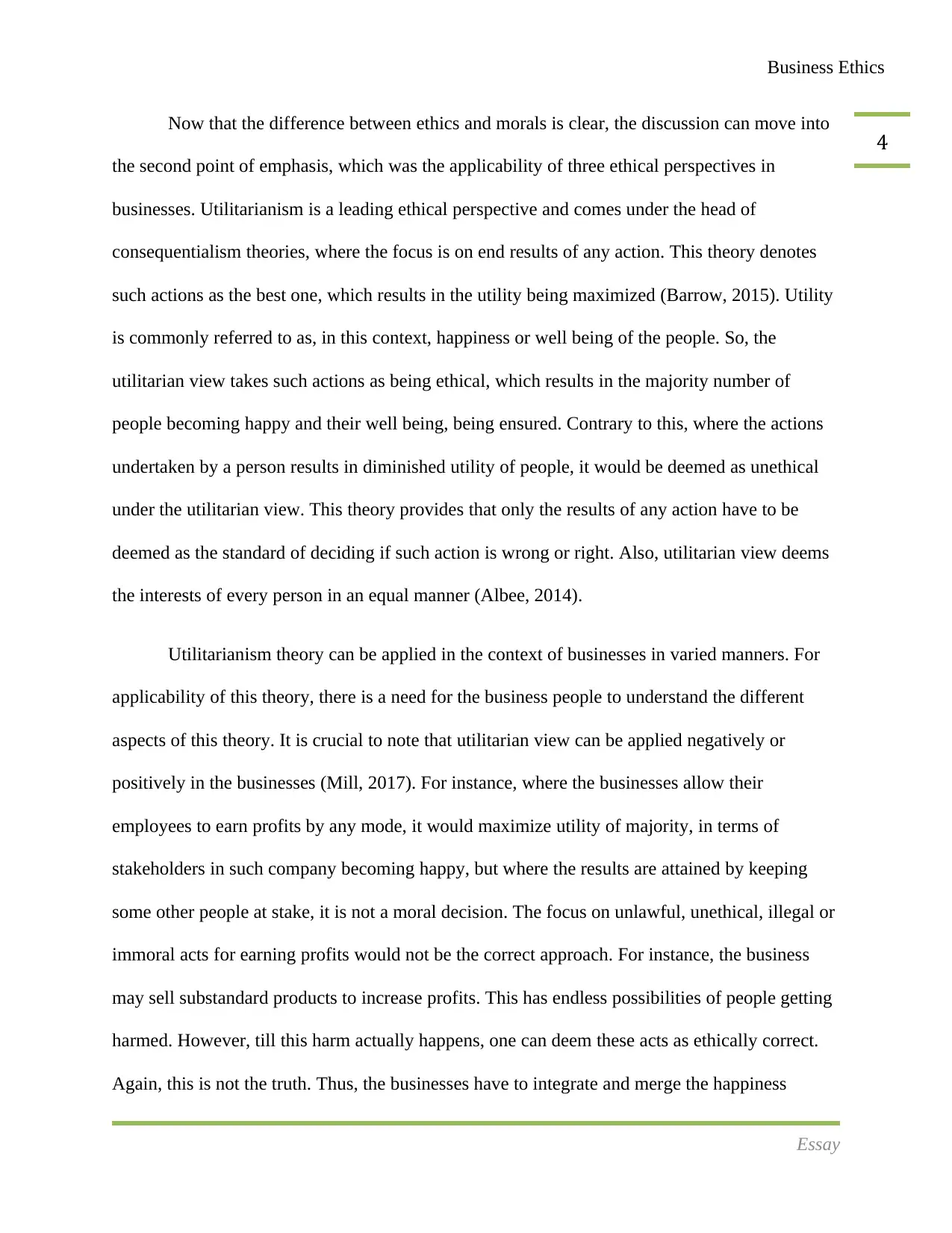
4
Business Ethics
Now that the difference between ethics and morals is clear, the discussion can move into
the second point of emphasis, which was the applicability of three ethical perspectives in
businesses. Utilitarianism is a leading ethical perspective and comes under the head of
consequentialism theories, where the focus is on end results of any action. This theory denotes
such actions as the best one, which results in the utility being maximized (Barrow, 2015). Utility
is commonly referred to as, in this context, happiness or well being of the people. So, the
utilitarian view takes such actions as being ethical, which results in the majority number of
people becoming happy and their well being, being ensured. Contrary to this, where the actions
undertaken by a person results in diminished utility of people, it would be deemed as unethical
under the utilitarian view. This theory provides that only the results of any action have to be
deemed as the standard of deciding if such action is wrong or right. Also, utilitarian view deems
the interests of every person in an equal manner (Albee, 2014).
Utilitarianism theory can be applied in the context of businesses in varied manners. For
applicability of this theory, there is a need for the business people to understand the different
aspects of this theory. It is crucial to note that utilitarian view can be applied negatively or
positively in the businesses (Mill, 2017). For instance, where the businesses allow their
employees to earn profits by any mode, it would maximize utility of majority, in terms of
stakeholders in such company becoming happy, but where the results are attained by keeping
some other people at stake, it is not a moral decision. The focus on unlawful, unethical, illegal or
immoral acts for earning profits would not be the correct approach. For instance, the business
may sell substandard products to increase profits. This has endless possibilities of people getting
harmed. However, till this harm actually happens, one can deem these acts as ethically correct.
Again, this is not the truth. Thus, the businesses have to integrate and merge the happiness
Essay
Business Ethics
Now that the difference between ethics and morals is clear, the discussion can move into
the second point of emphasis, which was the applicability of three ethical perspectives in
businesses. Utilitarianism is a leading ethical perspective and comes under the head of
consequentialism theories, where the focus is on end results of any action. This theory denotes
such actions as the best one, which results in the utility being maximized (Barrow, 2015). Utility
is commonly referred to as, in this context, happiness or well being of the people. So, the
utilitarian view takes such actions as being ethical, which results in the majority number of
people becoming happy and their well being, being ensured. Contrary to this, where the actions
undertaken by a person results in diminished utility of people, it would be deemed as unethical
under the utilitarian view. This theory provides that only the results of any action have to be
deemed as the standard of deciding if such action is wrong or right. Also, utilitarian view deems
the interests of every person in an equal manner (Albee, 2014).
Utilitarianism theory can be applied in the context of businesses in varied manners. For
applicability of this theory, there is a need for the business people to understand the different
aspects of this theory. It is crucial to note that utilitarian view can be applied negatively or
positively in the businesses (Mill, 2017). For instance, where the businesses allow their
employees to earn profits by any mode, it would maximize utility of majority, in terms of
stakeholders in such company becoming happy, but where the results are attained by keeping
some other people at stake, it is not a moral decision. The focus on unlawful, unethical, illegal or
immoral acts for earning profits would not be the correct approach. For instance, the business
may sell substandard products to increase profits. This has endless possibilities of people getting
harmed. However, till this harm actually happens, one can deem these acts as ethically correct.
Again, this is not the truth. Thus, the businesses have to integrate and merge the happiness
Essay
Secure Best Marks with AI Grader
Need help grading? Try our AI Grader for instant feedback on your assignments.
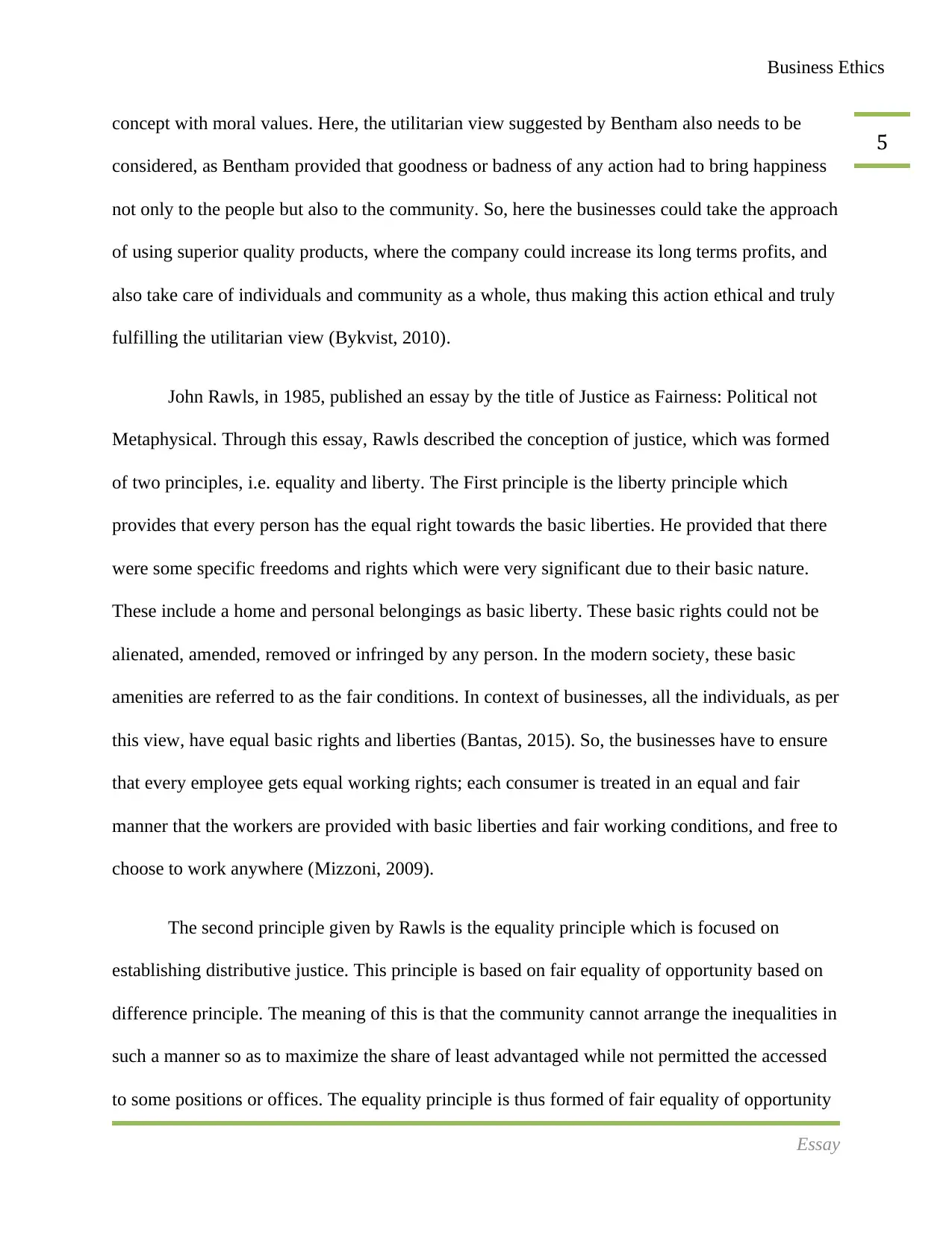
5
Business Ethics
concept with moral values. Here, the utilitarian view suggested by Bentham also needs to be
considered, as Bentham provided that goodness or badness of any action had to bring happiness
not only to the people but also to the community. So, here the businesses could take the approach
of using superior quality products, where the company could increase its long terms profits, and
also take care of individuals and community as a whole, thus making this action ethical and truly
fulfilling the utilitarian view (Bykvist, 2010).
John Rawls, in 1985, published an essay by the title of Justice as Fairness: Political not
Metaphysical. Through this essay, Rawls described the conception of justice, which was formed
of two principles, i.e. equality and liberty. The First principle is the liberty principle which
provides that every person has the equal right towards the basic liberties. He provided that there
were some specific freedoms and rights which were very significant due to their basic nature.
These include a home and personal belongings as basic liberty. These basic rights could not be
alienated, amended, removed or infringed by any person. In the modern society, these basic
amenities are referred to as the fair conditions. In context of businesses, all the individuals, as per
this view, have equal basic rights and liberties (Bantas, 2015). So, the businesses have to ensure
that every employee gets equal working rights; each consumer is treated in an equal and fair
manner that the workers are provided with basic liberties and fair working conditions, and free to
choose to work anywhere (Mizzoni, 2009).
The second principle given by Rawls is the equality principle which is focused on
establishing distributive justice. This principle is based on fair equality of opportunity based on
difference principle. The meaning of this is that the community cannot arrange the inequalities in
such a manner so as to maximize the share of least advantaged while not permitted the accessed
to some positions or offices. The equality principle is thus formed of fair equality of opportunity
Essay
Business Ethics
concept with moral values. Here, the utilitarian view suggested by Bentham also needs to be
considered, as Bentham provided that goodness or badness of any action had to bring happiness
not only to the people but also to the community. So, here the businesses could take the approach
of using superior quality products, where the company could increase its long terms profits, and
also take care of individuals and community as a whole, thus making this action ethical and truly
fulfilling the utilitarian view (Bykvist, 2010).
John Rawls, in 1985, published an essay by the title of Justice as Fairness: Political not
Metaphysical. Through this essay, Rawls described the conception of justice, which was formed
of two principles, i.e. equality and liberty. The First principle is the liberty principle which
provides that every person has the equal right towards the basic liberties. He provided that there
were some specific freedoms and rights which were very significant due to their basic nature.
These include a home and personal belongings as basic liberty. These basic rights could not be
alienated, amended, removed or infringed by any person. In the modern society, these basic
amenities are referred to as the fair conditions. In context of businesses, all the individuals, as per
this view, have equal basic rights and liberties (Bantas, 2015). So, the businesses have to ensure
that every employee gets equal working rights; each consumer is treated in an equal and fair
manner that the workers are provided with basic liberties and fair working conditions, and free to
choose to work anywhere (Mizzoni, 2009).
The second principle given by Rawls is the equality principle which is focused on
establishing distributive justice. This principle is based on fair equality of opportunity based on
difference principle. The meaning of this is that the community cannot arrange the inequalities in
such a manner so as to maximize the share of least advantaged while not permitted the accessed
to some positions or offices. The equality principle is thus formed of fair equality of opportunity
Essay
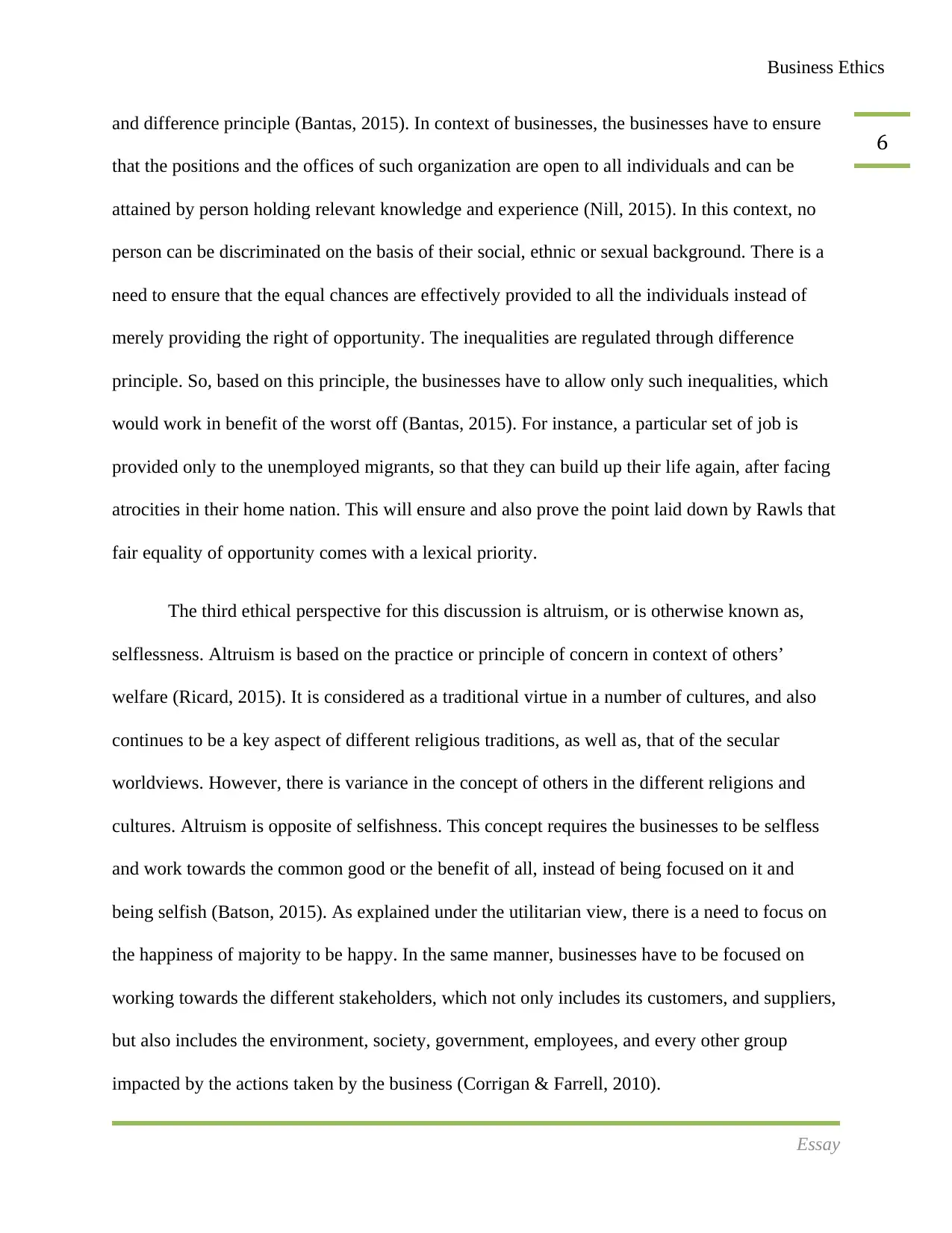
6
Business Ethics
and difference principle (Bantas, 2015). In context of businesses, the businesses have to ensure
that the positions and the offices of such organization are open to all individuals and can be
attained by person holding relevant knowledge and experience (Nill, 2015). In this context, no
person can be discriminated on the basis of their social, ethnic or sexual background. There is a
need to ensure that the equal chances are effectively provided to all the individuals instead of
merely providing the right of opportunity. The inequalities are regulated through difference
principle. So, based on this principle, the businesses have to allow only such inequalities, which
would work in benefit of the worst off (Bantas, 2015). For instance, a particular set of job is
provided only to the unemployed migrants, so that they can build up their life again, after facing
atrocities in their home nation. This will ensure and also prove the point laid down by Rawls that
fair equality of opportunity comes with a lexical priority.
The third ethical perspective for this discussion is altruism, or is otherwise known as,
selflessness. Altruism is based on the practice or principle of concern in context of others’
welfare (Ricard, 2015). It is considered as a traditional virtue in a number of cultures, and also
continues to be a key aspect of different religious traditions, as well as, that of the secular
worldviews. However, there is variance in the concept of others in the different religions and
cultures. Altruism is opposite of selfishness. This concept requires the businesses to be selfless
and work towards the common good or the benefit of all, instead of being focused on it and
being selfish (Batson, 2015). As explained under the utilitarian view, there is a need to focus on
the happiness of majority to be happy. In the same manner, businesses have to be focused on
working towards the different stakeholders, which not only includes its customers, and suppliers,
but also includes the environment, society, government, employees, and every other group
impacted by the actions taken by the business (Corrigan & Farrell, 2010).
Essay
Business Ethics
and difference principle (Bantas, 2015). In context of businesses, the businesses have to ensure
that the positions and the offices of such organization are open to all individuals and can be
attained by person holding relevant knowledge and experience (Nill, 2015). In this context, no
person can be discriminated on the basis of their social, ethnic or sexual background. There is a
need to ensure that the equal chances are effectively provided to all the individuals instead of
merely providing the right of opportunity. The inequalities are regulated through difference
principle. So, based on this principle, the businesses have to allow only such inequalities, which
would work in benefit of the worst off (Bantas, 2015). For instance, a particular set of job is
provided only to the unemployed migrants, so that they can build up their life again, after facing
atrocities in their home nation. This will ensure and also prove the point laid down by Rawls that
fair equality of opportunity comes with a lexical priority.
The third ethical perspective for this discussion is altruism, or is otherwise known as,
selflessness. Altruism is based on the practice or principle of concern in context of others’
welfare (Ricard, 2015). It is considered as a traditional virtue in a number of cultures, and also
continues to be a key aspect of different religious traditions, as well as, that of the secular
worldviews. However, there is variance in the concept of others in the different religions and
cultures. Altruism is opposite of selfishness. This concept requires the businesses to be selfless
and work towards the common good or the benefit of all, instead of being focused on it and
being selfish (Batson, 2015). As explained under the utilitarian view, there is a need to focus on
the happiness of majority to be happy. In the same manner, businesses have to be focused on
working towards the different stakeholders, which not only includes its customers, and suppliers,
but also includes the environment, society, government, employees, and every other group
impacted by the actions taken by the business (Corrigan & Farrell, 2010).
Essay
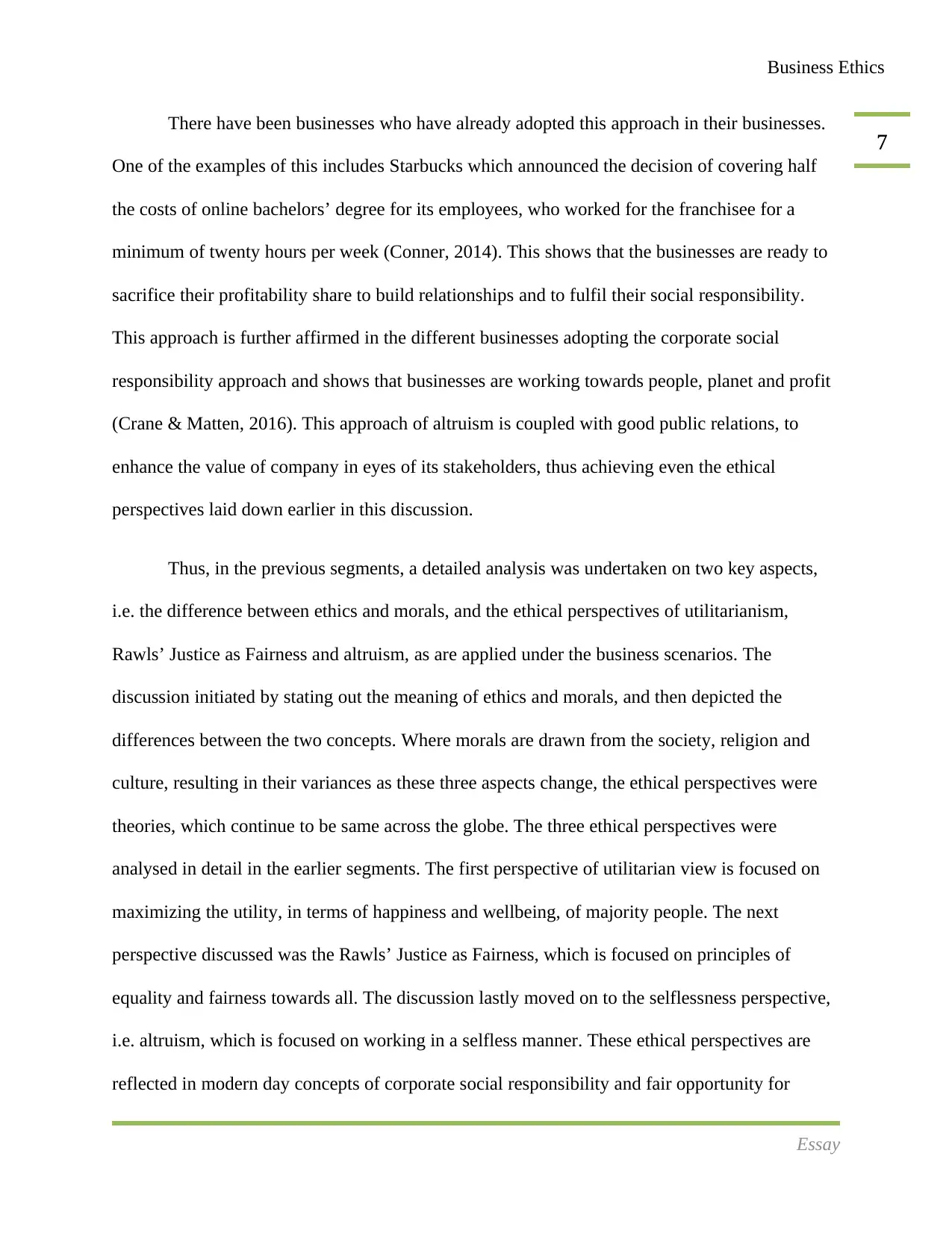
7
Business Ethics
There have been businesses who have already adopted this approach in their businesses.
One of the examples of this includes Starbucks which announced the decision of covering half
the costs of online bachelors’ degree for its employees, who worked for the franchisee for a
minimum of twenty hours per week (Conner, 2014). This shows that the businesses are ready to
sacrifice their profitability share to build relationships and to fulfil their social responsibility.
This approach is further affirmed in the different businesses adopting the corporate social
responsibility approach and shows that businesses are working towards people, planet and profit
(Crane & Matten, 2016). This approach of altruism is coupled with good public relations, to
enhance the value of company in eyes of its stakeholders, thus achieving even the ethical
perspectives laid down earlier in this discussion.
Thus, in the previous segments, a detailed analysis was undertaken on two key aspects,
i.e. the difference between ethics and morals, and the ethical perspectives of utilitarianism,
Rawls’ Justice as Fairness and altruism, as are applied under the business scenarios. The
discussion initiated by stating out the meaning of ethics and morals, and then depicted the
differences between the two concepts. Where morals are drawn from the society, religion and
culture, resulting in their variances as these three aspects change, the ethical perspectives were
theories, which continue to be same across the globe. The three ethical perspectives were
analysed in detail in the earlier segments. The first perspective of utilitarian view is focused on
maximizing the utility, in terms of happiness and wellbeing, of majority people. The next
perspective discussed was the Rawls’ Justice as Fairness, which is focused on principles of
equality and fairness towards all. The discussion lastly moved on to the selflessness perspective,
i.e. altruism, which is focused on working in a selfless manner. These ethical perspectives are
reflected in modern day concepts of corporate social responsibility and fair opportunity for
Essay
Business Ethics
There have been businesses who have already adopted this approach in their businesses.
One of the examples of this includes Starbucks which announced the decision of covering half
the costs of online bachelors’ degree for its employees, who worked for the franchisee for a
minimum of twenty hours per week (Conner, 2014). This shows that the businesses are ready to
sacrifice their profitability share to build relationships and to fulfil their social responsibility.
This approach is further affirmed in the different businesses adopting the corporate social
responsibility approach and shows that businesses are working towards people, planet and profit
(Crane & Matten, 2016). This approach of altruism is coupled with good public relations, to
enhance the value of company in eyes of its stakeholders, thus achieving even the ethical
perspectives laid down earlier in this discussion.
Thus, in the previous segments, a detailed analysis was undertaken on two key aspects,
i.e. the difference between ethics and morals, and the ethical perspectives of utilitarianism,
Rawls’ Justice as Fairness and altruism, as are applied under the business scenarios. The
discussion initiated by stating out the meaning of ethics and morals, and then depicted the
differences between the two concepts. Where morals are drawn from the society, religion and
culture, resulting in their variances as these three aspects change, the ethical perspectives were
theories, which continue to be same across the globe. The three ethical perspectives were
analysed in detail in the earlier segments. The first perspective of utilitarian view is focused on
maximizing the utility, in terms of happiness and wellbeing, of majority people. The next
perspective discussed was the Rawls’ Justice as Fairness, which is focused on principles of
equality and fairness towards all. The discussion lastly moved on to the selflessness perspective,
i.e. altruism, which is focused on working in a selfless manner. These ethical perspectives are
reflected in modern day concepts of corporate social responsibility and fair opportunity for
Essay
Paraphrase This Document
Need a fresh take? Get an instant paraphrase of this document with our AI Paraphraser
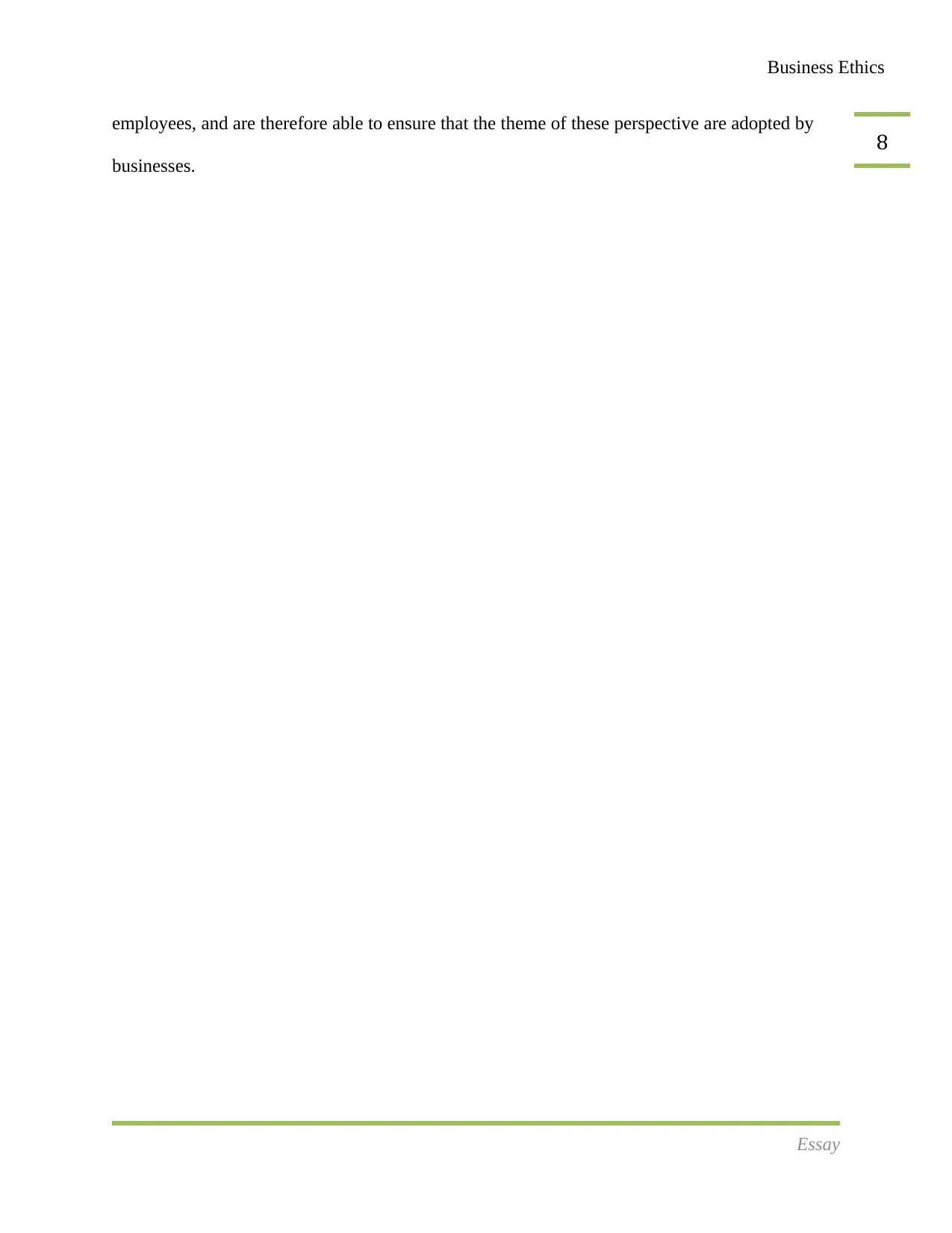
8
Business Ethics
employees, and are therefore able to ensure that the theme of these perspective are adopted by
businesses.
Essay
Business Ethics
employees, and are therefore able to ensure that the theme of these perspective are adopted by
businesses.
Essay
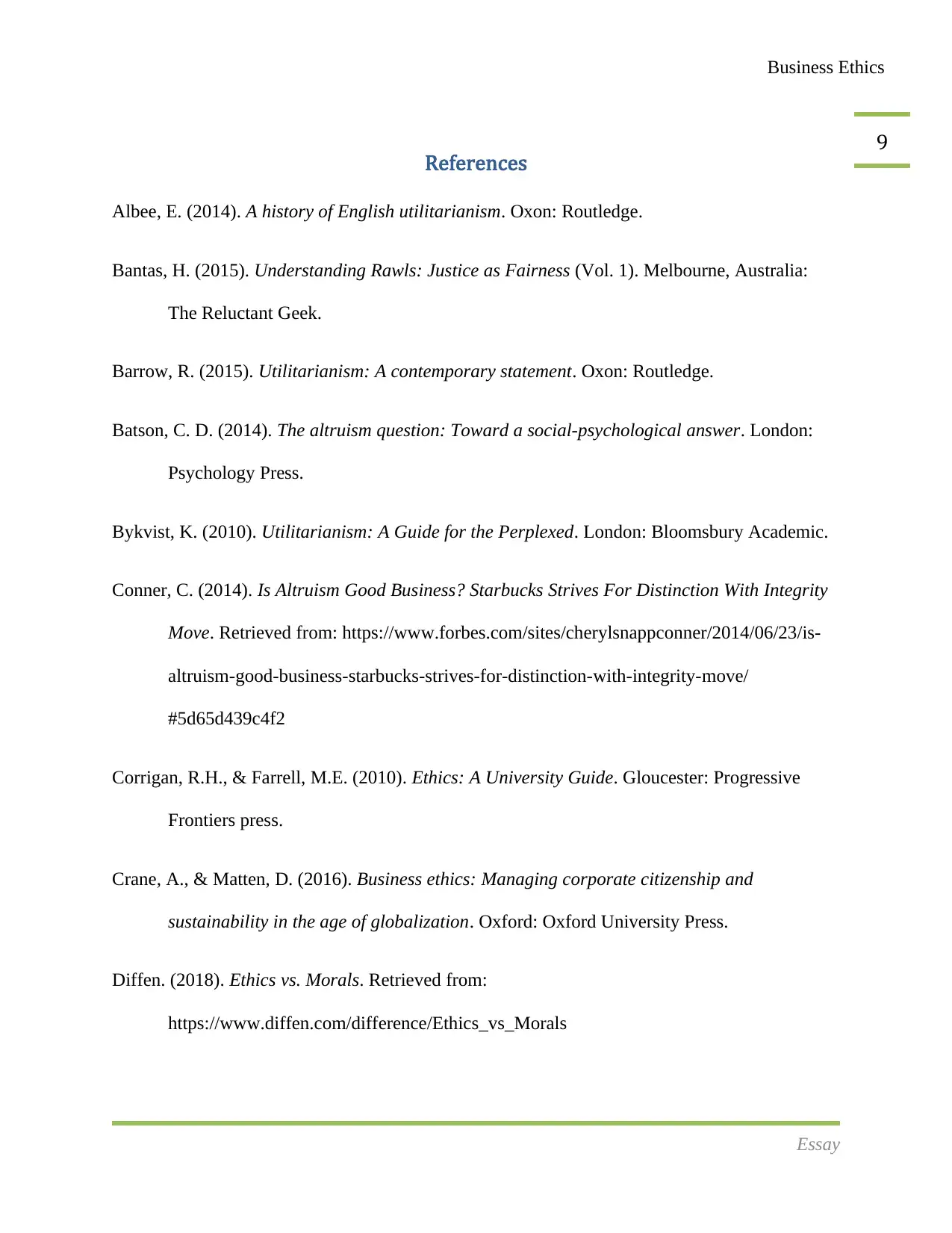
9
Business Ethics
References
Albee, E. (2014). A history of English utilitarianism. Oxon: Routledge.
Bantas, H. (2015). Understanding Rawls: Justice as Fairness (Vol. 1). Melbourne, Australia:
The Reluctant Geek.
Barrow, R. (2015). Utilitarianism: A contemporary statement. Oxon: Routledge.
Batson, C. D. (2014). The altruism question: Toward a social-psychological answer. London:
Psychology Press.
Bykvist, K. (2010). Utilitarianism: A Guide for the Perplexed. London: Bloomsbury Academic.
Conner, C. (2014). Is Altruism Good Business? Starbucks Strives For Distinction With Integrity
Move. Retrieved from: https://www.forbes.com/sites/cherylsnappconner/2014/06/23/is-
altruism-good-business-starbucks-strives-for-distinction-with-integrity-move/
#5d65d439c4f2
Corrigan, R.H., & Farrell, M.E. (2010). Ethics: A University Guide. Gloucester: Progressive
Frontiers press.
Crane, A., & Matten, D. (2016). Business ethics: Managing corporate citizenship and
sustainability in the age of globalization. Oxford: Oxford University Press.
Diffen. (2018). Ethics vs. Morals. Retrieved from:
https://www.diffen.com/difference/Ethics_vs_Morals
Essay
Business Ethics
References
Albee, E. (2014). A history of English utilitarianism. Oxon: Routledge.
Bantas, H. (2015). Understanding Rawls: Justice as Fairness (Vol. 1). Melbourne, Australia:
The Reluctant Geek.
Barrow, R. (2015). Utilitarianism: A contemporary statement. Oxon: Routledge.
Batson, C. D. (2014). The altruism question: Toward a social-psychological answer. London:
Psychology Press.
Bykvist, K. (2010). Utilitarianism: A Guide for the Perplexed. London: Bloomsbury Academic.
Conner, C. (2014). Is Altruism Good Business? Starbucks Strives For Distinction With Integrity
Move. Retrieved from: https://www.forbes.com/sites/cherylsnappconner/2014/06/23/is-
altruism-good-business-starbucks-strives-for-distinction-with-integrity-move/
#5d65d439c4f2
Corrigan, R.H., & Farrell, M.E. (2010). Ethics: A University Guide. Gloucester: Progressive
Frontiers press.
Crane, A., & Matten, D. (2016). Business ethics: Managing corporate citizenship and
sustainability in the age of globalization. Oxford: Oxford University Press.
Diffen. (2018). Ethics vs. Morals. Retrieved from:
https://www.diffen.com/difference/Ethics_vs_Morals
Essay
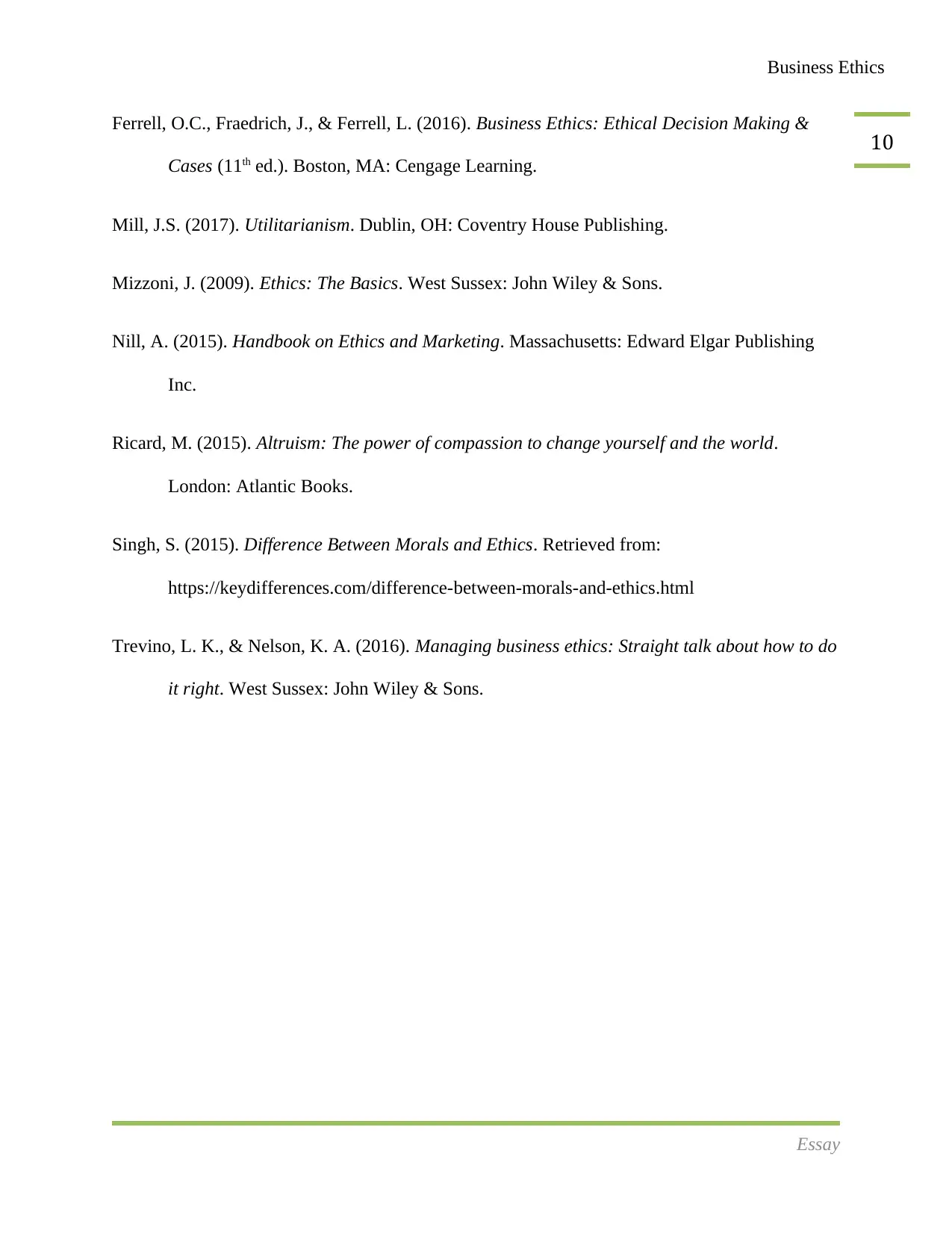
10
Business Ethics
Ferrell, O.C., Fraedrich, J., & Ferrell, L. (2016). Business Ethics: Ethical Decision Making &
Cases (11th ed.). Boston, MA: Cengage Learning.
Mill, J.S. (2017). Utilitarianism. Dublin, OH: Coventry House Publishing.
Mizzoni, J. (2009). Ethics: The Basics. West Sussex: John Wiley & Sons.
Nill, A. (2015). Handbook on Ethics and Marketing. Massachusetts: Edward Elgar Publishing
Inc.
Ricard, M. (2015). Altruism: The power of compassion to change yourself and the world.
London: Atlantic Books.
Singh, S. (2015). Difference Between Morals and Ethics. Retrieved from:
https://keydifferences.com/difference-between-morals-and-ethics.html
Trevino, L. K., & Nelson, K. A. (2016). Managing business ethics: Straight talk about how to do
it right. West Sussex: John Wiley & Sons.
Essay
Business Ethics
Ferrell, O.C., Fraedrich, J., & Ferrell, L. (2016). Business Ethics: Ethical Decision Making &
Cases (11th ed.). Boston, MA: Cengage Learning.
Mill, J.S. (2017). Utilitarianism. Dublin, OH: Coventry House Publishing.
Mizzoni, J. (2009). Ethics: The Basics. West Sussex: John Wiley & Sons.
Nill, A. (2015). Handbook on Ethics and Marketing. Massachusetts: Edward Elgar Publishing
Inc.
Ricard, M. (2015). Altruism: The power of compassion to change yourself and the world.
London: Atlantic Books.
Singh, S. (2015). Difference Between Morals and Ethics. Retrieved from:
https://keydifferences.com/difference-between-morals-and-ethics.html
Trevino, L. K., & Nelson, K. A. (2016). Managing business ethics: Straight talk about how to do
it right. West Sussex: John Wiley & Sons.
Essay
1 out of 10
Your All-in-One AI-Powered Toolkit for Academic Success.
+13062052269
info@desklib.com
Available 24*7 on WhatsApp / Email
![[object Object]](/_next/static/media/star-bottom.7253800d.svg)
Unlock your academic potential
© 2024 | Zucol Services PVT LTD | All rights reserved.





